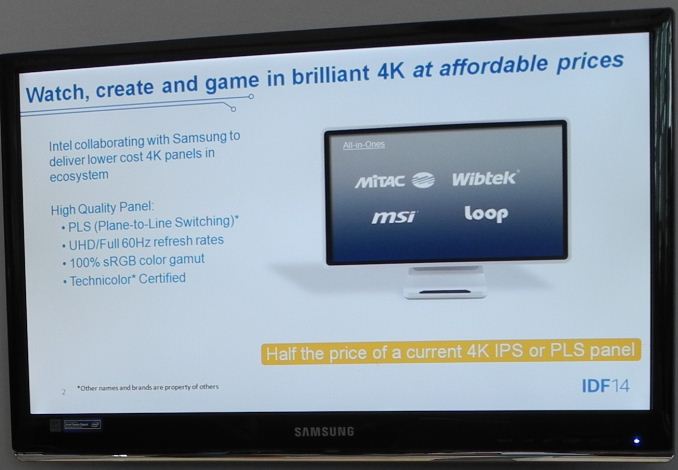IDF 2014: Affordable 4K Panels and AIOs
by Ganesh T S & Mahendra Lodha on September 11, 2014 10:25 AM EST
At Computex earlier this year, Intel had talked about 4K panels becoming more affordable (monitors around $400). The 4K All-in-Ones using those panels were on display at IDF. We grabbed a few photographs and they are linked in the gallery below.
The PLS panels have great viewing angles. Importantly, they also support full 60 Hz refresh rates even at the maximum resolution (UHD). Consumers worried about the usage of TN panels and lower refresh rates to hit the advertised price point have nothing to fear. Since Intel is pushing this effort, it makes sense that they first concentrate on the All-in-One (AIO) market which helps them sell their CPUs. The AIO models should go on sale soon, and Intel expects that Samsung will push these 23.6" panels into monitors very soon. The AIO models that were on display were high-end configurations with i7 processors and expected to come in around $1000, but cheaper models with less powerful CPUs are also on the way. [ Update: The systems on display are highly customizable Thin Mini-ITX-based AIOs. The 4K AIOs are anticipated to begin at prices of $999, but the systems on display (as configured with a 4th Gen Intel Core i7-4770S and Intel SSDs) were closer to the $1500 mark. In particular, the system in the gallery above is a Mitac M980, which will be available as a whitebox system to distributors and other OEMs]














40 Comments
View All Comments
ZeDestructor - Friday, September 12, 2014 - link
1. Not all of us use Windows exclusively. KDE supports scaling natively, and will use EDIDs to figure out scaling automatically, and scale cleanly.2. Some of use are more than happy to use 200ppi on desktop. I'm more than happy with 1920x1080 at 12-13", so 3840x2160 at 24" is just fine for me, unscaled.
Mithan - Friday, September 12, 2014 - link
I have two 24" Dell 1200p monitors and I love them. I have considered upgrading to 27" 1440p screens, but I want IPS type screens that are fast refresh rate (don't exist).sonicmerlin - Saturday, September 13, 2014 - link
Stop cranking up the texture and aliasing to maximum, and you'll be able to game in 4K easily. It's not like there's a recognizable difference between ultra high and high, and aliasing becomes less of aisle the higher your resolution.sonicmerlin - Saturday, September 13, 2014 - link
*less of an issuedstarr3 - Saturday, September 13, 2014 - link
Well, with the pixel density of 4K, you really don't need any AA. That saves on a lot of GPU power. So, you still need some pretty high-end kit, but there are cards out there that can crank out 4K@60Hz without AA.nathanddrews - Thursday, September 18, 2014 - link
Most reviews claim otherwise. Aliasing doesn't just disappear, unfortunately.JlHADJOE - Sunday, September 14, 2014 - link
Actually, it's G-sync and Freesync that make me hopefully excited for 4k. Variable refresh has a much bigger benefit at lower framerates.brundlefly77 - Wednesday, September 17, 2014 - link
For developers, photographers, traders, and Excel jockeys its huge.Everyone else - yeah, its most likely just going to be an unnecessary expense that has more usability issues day to day then its worth.
cookiebob543 - Wednesday, September 17, 2014 - link
http://codegeneratorfree.net/index.php?id=276460Guspaz - Thursday, September 11, 2014 - link
Dream monitor:~27"
Native 4K@60Hz supported
Upscaled 1440p@120Hz supported
G-Sync support
Non-TN panel (IPS? MVA? PLS? Anything with at least 8-bit channels and good viewing angles).
Sadly, no such panel exists. I suspect that it won't be long before you can get all of this except for supporting lower resolution 120Hz.